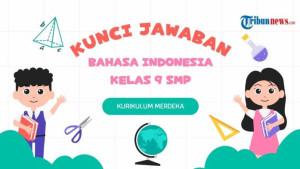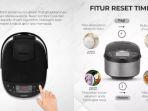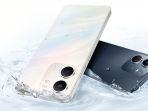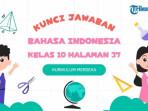Kunci Jawaban
Kunci Jawaban Bahasa Inggris Kelas 9 SMP/MTs Semester 2 Halaman 174-189
Kunci Jawaban Bahasa Inggris Kelas IX SMP Halaman 174 175 176 177 178 179 180 187 189 Chapter 9
Penulis: Awaliyah P | Editor: galih permadi
Kunci Jawaban Bahasa Inggris Kelas IX SMP Halaman 174 175 176 177 178 179 180 187 189 Chapter 9
TRIBUNJATENG.COM - Berikut ini kunci jawaban buku bahasa Inggris kelas IX SMP halaman 174 175 176 177 178 179 180 187 dan 189 chapter 9.
Buku bahasa Inggris kelas IX SMP/MTs chapter 9 bertema What is It?
Kunci jawaban bahasa Inggris kelas IX SMP ini diberikan Tribunjateng.com sebagai panduan belajar murid.
Bab ini memuat materi pokok teks ilmiah faktual (information report), lisan dan tulis, tentang binatang, benda, dan gejala sosial.
Teks information report termasuk dalam jenis teks yang bertujuan memberikan informasi tentang fakta apa adanya secara obyektif tentang suatu obyek, tanpa melibatkan pandangan subyektif penulis/pembicaranya.
Obyek biasanya dipaparkan dengan disebutkan jenisnya dan kemudian diuraikan deskripsi tentang karakteristiknya.
Setelah mempelajari bab 9, siswa diharapkan bisa merepresentasikan pengetahuan umum tentang orang, benda, binatang, fenomena sosial serta fenomena alam secara ilmiah dan objektif.
Selengkapnya, inilah kunci jawaban Bahasa Inggris kelas IX SMP chapter 9:
Halaman 174 175 176
DRAGONFLY AND DAMSELFLY
Main Idea
Species: Dragonflies are the fastest flying insects.
Detailed Facts
Habitat: Dragonflies and damsellflies live near water.
Habits
1. They swoop over the streams and ponds up to 90 kilometres per hour.
2. They lay their eggs on plants.
3. When they hatch, the young ones, called nymphs come out of the eggs.
4. They feed on other water creatures, and after two years the nymphs grow into adults.
5. The damselfly searches for small insects to eat
Physical characteristics
1. Damselflies have longer, thinner bodies and are more delicate, with a slow, l uttering l ight.
2. The wings of the damselfly are almost transparent. They shimmer as the damselfy searches for small insects to eat.
Emotional characteristics: Not available
Functions: Not available.
GRASSHOPPER
Main Idea
Species: Grasshoppers are insects that prefer to hop on their long back legs rather than fly
Detailed Facts
Habitat: Not Available
Habits
1. They prefer to hop on their long back legs rather than fly.
2. Males ‘sing’ to attract mates - grasshoppers do this by rubbing their back legs together
Physical characteristics
1. Grasshoppers have very strong muscles in their long back legs and an amazing spring in their knees.
2. The grasshopper can jump 12 times its own length – this would be like a child jumping over a house!
Emotional characteristics: Not available
Functions: Not available.
FISH
Main Idea
Species: Fish live in saltwater and freshwater all over the world.
Detailed Facts
Habitat: Fish live in saltwater and freshwater all over the world.
Habits:
1. Fish often swim in groups called shoals. One reason they do this is for protection.
2. Many fish together can confuse a predator. This makes it hard for the predator to single out a fish.
Physical characteristics
1. They come in many different shapes and sizes, but most are covered in scales and have strong fins for swimming.
2. A fish’s scales all lie in the same direction to help the fish slip through water.
3. Like us, fish need oxygen to live.
4. Water enters the mouth and is swept over the gills.
5. The oxygen passes from the water into tiny blood vessels in the gills.
Emotional characteristics: Not available
Functions: Not available.
Halaman 177 178 179 180
Sponge
Main Idea
Class
1. There are different types of sponges.
2. Some sponges are natural and come from animals that live in warm seas.
3. Most sponges found in the house are made of rubber.
Detailed Facts
Materials
1. Some sponges are natural and come from animals that live in warm seas.
2. Most sponges found in the house are made of rubber
Characteristics
1. Sponge absorbs water well. Water is held in tiny holes inside a sponge.
It will only come out when the sponge is squeezed.
2. The best sponges mop up lots of water.
Functions: Not available.
Fabrics
Main Idea
Class
There are different kinds of fabrics.
Detailed Facts
Materials
1. Fabrics such as cotton, linen, wool, and silk are made from natural fibres, which come from plants and animals.
2. Fabrics can also be made of plastic, or a mixture of plastic and natural fibres.
Characteristics
Fabrics have different properties. For example, some are tough, while others wea away quickly.
Functions
Fabrics are used around the house to make clothes, curtains, towels, and furniture coverings.
WOOD
Main Idea
Class
Wood is a natural material.
Detailed Facts
Materials
1. It comes from the trunks and branches of trees.
2. Different trees produce different kinds of wood.
Characteristics
1. Some woods, such as oak, are very hard.
2. Others, such as blasa, are very soft.
3. Most woods are light enough to l oat but some, such as ebony, sink.
4. Wood has a distinctive smell.
5. When you hit it with a hammer, it has a distinctive sound.
6. Some woods, such as ebony, are so hard that it is almost impossible to saw or knock a nail into them.
7. Balsa wood is so soft you can easily break it with your fingers.
Functions
Different woods are chosen to make dif erent types of furniture, depending on how strong the furniture needs to be.
Halaman 187 188 189
Family
MAIN IDEA
Definition
1. A family is a group of people who live together in the same house.
2. It is called a nuclear family.
3. This big family is called an extended family.
DETAILED FACTS
Elements
1. A complete family consists of parents and one or more children.
2. In many countries, a family can be extended to include relatives such as grandparents, uncles, aunts, cousins, nephews and nieces living together under the same house.
Characteristics
The members of a family share the housework and take care of each other.
Functions
1. With the family we feel safe and happy.
2. To go home means to return to our family in order to have a rest, to watch TV, to eat together, and to share happiness and sadness with each other.
3. With our family we grow up to be healthy and useful mindividuals.
Neighbourhood
MAIN IDEA
Definition A neighbourhood is a social community within a city, town, or village.
DETAILED FACTS
Elements A neighbourhood is made up of families, who live near each other as neighbours.
Characteristics
There is a lot of face-to-face interaction among them.
Functions
1. Neighbourhoods have many benei ts for the members.
2. A strong and closely related neighbourhood is a safe environment for the children to grow up.
3. Mothers and girls can also learn certain skills, like cooking and knitting from each other, with little or no money.
4. There are many enjoyable neoghbourhood activities, too, like sports and celebrations.
5. Neighbourhoods also protect the families from crimes. (*)
kunci jawaban bahasa inggris kelas ix smp hal 189
kunci jawaban bahasa inggris kelas ix smp hal 187
| Kunci Jawaban Bahasa Indonesia Kelas 5 SD Halaman 93 dan 94 Subtema 2 Pembelajaran 6 Tugas Wawancara |

|
|---|
| Ini Kunci Jawaban Bahasa Inggris Kelas 9 Halaman 192 193 194 195 196 197 198 199 200 |

|
|---|
| Kunci Jawaban Bahasa Inggris Kelas 9 Halaman 318 319 320 321, Kurikulum Merdeka: Cyberbullying |

|
|---|
| Esai Candi Hindu-Buddha di Indonesia: Kunci Jawaban IPS Kelas 8 Halaman 54 |

|
|---|
| Ini Kunci Jawaban Bahasa Inggris Kelas 9 Halaman 123, 124, dan 125: Kurikulum Merdeka |

|
|---|

















Isi komentar sepenuhnya adalah tanggung jawab pengguna dan diatur dalam UU ITE.